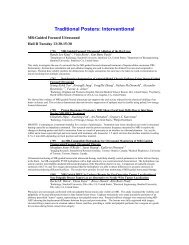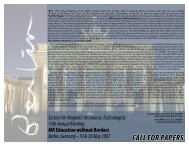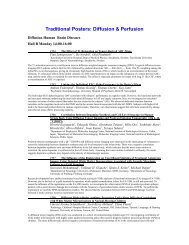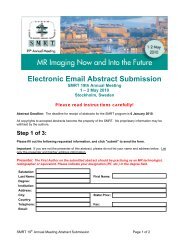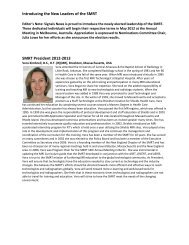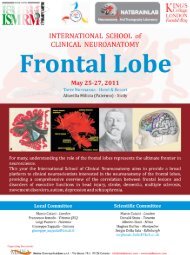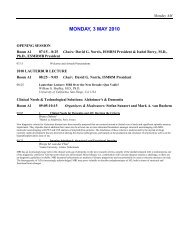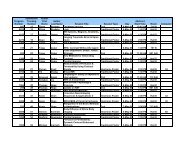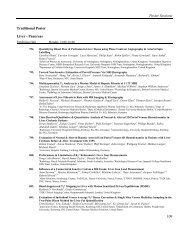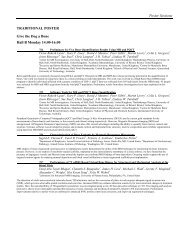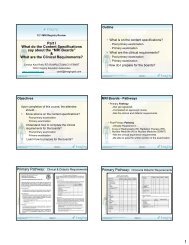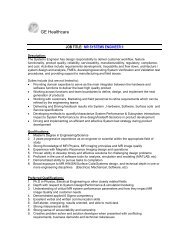Walk-through-the-week Overview - ismrm
Walk-through-the-week Overview - ismrm
Walk-through-the-week Overview - ismrm
Create successful ePaper yourself
Turn your PDF publications into a flip-book with our unique Google optimized e-Paper software.
WEEKEND EDUCATIONAL COURSES– Saturday<br />
9<br />
The WEEKEND (7-8 May 2005):<br />
The <strong>week</strong> at <strong>the</strong> ISMRM<br />
begins with intensive oneand<br />
two-day Educational<br />
Courses that cover a broad<br />
span of basic science and<br />
clinical topics. On Saturday,<br />
clinical courses include <strong>the</strong><br />
new introductory “Clinical<br />
MRI: From Physical Principles<br />
to Practical Protocols” and<br />
o<strong>the</strong>r day-long courses on<br />
Artifacts and Pitfalls, Breast<br />
Imaging, and Clinical MR<br />
Spectroscopy. On Sunday,<br />
day-long courses include<br />
courses focusing on Body,<br />
Neuro, Musculoskeletal, and<br />
Cardiac MR. Educational<br />
offerings with relevance to<br />
tomorrow’s application in <strong>the</strong><br />
clinic include courses on<br />
Cancer, Functional MRI and<br />
<strong>the</strong> rapidly evolving field of<br />
“MR and Molecular Imaging.”<br />
The new “Meet-<strong>the</strong>-Teacher-<br />
Breaks” will provide <strong>the</strong><br />
opportunity for one-to-one<br />
contact between attendees<br />
and lecturers.<br />
OTHER COURSES OFFERED:<br />
MR Physics for<br />
Physicists<br />
Saturday, 7 May, 08:30 - 17:55<br />
Sunday, 8 May, 08:00 - 15:00<br />
Quantitative Image and<br />
Data Analysis<br />
Saturday, 7 May, 08:30 - 17:30<br />
MR and Molecular<br />
Imaging<br />
Saturday, 7 May, 08:30 - 17:15<br />
Current Debates and<br />
Recent Advances in<br />
Functional MRI<br />
Sunday, 8 May, 08:15 - 17:30<br />
Clinical MRI Course:<br />
From Physical Principles<br />
to Practical Protocols<br />
A full-day introduction integrating MR physics<br />
and clinical protocols<br />
Joshua M. Farber, Vivian S. Lee, David J. Lomas, and James F.M. Meaney,<br />
Organizers<br />
Saturday, 7 May, 08:00 - 17:30<br />
OVERVIEW<br />
This course is designed for trainees in MRI, practicing clinicians,<br />
and MRI technologists. The purpose of this course is to provide<br />
a basic overview of <strong>the</strong> physical principles underlying <strong>the</strong><br />
generation of MR images with a view toward understanding how<br />
and why <strong>the</strong>se principles are important in practical clinical<br />
protocols. Following a brief introduction, pairs of presentations<br />
(one on physics, one on clinical protocols) will focus on specific<br />
systems: musculoskeletal, body, vascular, neurological, and<br />
cardiac. Over <strong>the</strong> course of <strong>the</strong> day, physics speakers will build<br />
on physics topics and protocol speakers will use physical<br />
principles to illustrate protocol choices and trouble-shooting<br />
tips. This course starts <strong>the</strong> <strong>week</strong>-long program, ISMRM CLINICAL<br />
MRI COURSE: FROM PRINCIPLES TO PRACTICE, (see page 11).<br />
Speakers: H. Cecil Charles, Martin John Graves, Frank R. Korosec,<br />
Vivian S. Lee, David J. Lomas, Christine H. Lorenz, James F. M.<br />
Meaney, David J. Mikulis, Timothy J. Mosher, Norbert J. Pelc, and<br />
Timothy P. L. Roberts.<br />
EDUCATIONAL OBJECTIVES<br />
Upon completion of this course, participants should be able to:<br />
• Describe <strong>the</strong> basic physics principles of MRI;<br />
• Explain <strong>the</strong> physics principles underlying common sequences<br />
used in musculoskeletal imaging, body imaging, vascular<br />
imaging, neurological imaging and cardiac imaging, and apply<br />
<strong>the</strong>se principles in protocol design for common indications;<br />
• Recognize and avoid common pitfalls that arise in standard<br />
imaging protocols.<br />
Artifacts and Pitfalls:<br />
Optimization in <strong>the</strong> Clinic<br />
Kim Butts and Naeem Merchant,<br />
Organizers<br />
Saturday, 7 May, 08:30 - 17:30<br />
OVERVIEW<br />
This course is designed to describe<br />
<strong>the</strong> artifacts and pitfalls seen in<br />
many aspects of clinical MR<br />
imaging. The course is divided by<br />
body area and will cover hot topics<br />
in artifacts and pitfalls in each<br />
area. Several general lectures on<br />
artifacts will also be given.<br />
Clinicians are <strong>the</strong> target audience<br />
and most of <strong>the</strong> lectures will be<br />
given by clinicians.<br />
Speakers: Matt A. Bernstein, Bruce<br />
L. Daniel, David N. Firmin, Masoom<br />
Abbas Haider, Bob S. Hu, Raymond<br />
J. Kim, Denis Le Bihan, David J.<br />
Lomas, James F. M. Meaney,<br />
William B. Morrison, Sarah J.<br />
Nelson, Scott B. Reeder, Caroline<br />
Reinhold, and Mark Schweitzer.<br />
EDUCATIONAL OBJECTIVES<br />
Upon completion of this course,<br />
participants should be able to:<br />
• Recognize artifacts and pitfalls in<br />
clinical MR imaging;<br />
• Identify <strong>the</strong> causes and cures<br />
for <strong>the</strong>se problems;<br />
• Recommend ways to deal with<br />
<strong>the</strong>se artifacts when <strong>the</strong>y are<br />
encountered in <strong>the</strong>ir practice;<br />
• Recommend ways to improve<br />
<strong>the</strong>ir clinical imaging protocols;<br />
• Appraise <strong>the</strong>ir own image<br />
quality in terms of <strong>the</strong> artifacts<br />
seen.<br />
Breast Imaging<br />
Kimberly Amrami and<br />
Nola Hylton, Organizers<br />
Saturday, 7 May, 09:00 - 18:00<br />
OVERVIEW<br />
This course will review current<br />
and emerging applications of MRI<br />
to breast cancer detection and<br />
diagnosis. Techniques for<br />
performing breast MR imaging and<br />
MR-directed breast interventions<br />
will be described and applications<br />
to breast cancer screening,<br />
differential diagnosis, disease<br />
staging and treatment response<br />
assessment will be critically<br />
evaluated. Promising developments<br />
on <strong>the</strong> horizon, including high field<br />
breast MRI, breast MRS and<br />
elastography, will be discussed.<br />
Speakers: Patrick Bolan, Kathy<br />
Brandt, Richard L. Ehman, Nola<br />
Hylton, Debra M. Ikeda, Michael V.<br />
Knopp, Christiane K. Kuhl,<br />
Constance D. Lehman, and<br />
Elizabeth A. Morris.<br />
EDUCATIONAL OBJECTIVES<br />
Upon completion of this course,<br />
participants should be able to:<br />
• Describe <strong>the</strong> clinical<br />
indications for MR imaging of<br />
<strong>the</strong> breast;<br />
• Compare and contrast MRI with<br />
conventional breast imaging<br />
methods for breast cancer<br />
detection, diagnosis and<br />
staging;<br />
• Evaluate <strong>the</strong> relative<br />
advantages and disadvantages<br />
of different imaging techniques<br />
and approaches for breast MRI;<br />
• Identify <strong>the</strong> various MR-guided<br />
interventional<br />
procedures for <strong>the</strong> breast;<br />
• Appraise <strong>the</strong> benefits and<br />
limitations of MRI for<br />
breast cancer screening<br />
for high risk women;<br />
• Describe <strong>the</strong> techniques and<br />
potential applications for MR<br />
spectroscopy of <strong>the</strong> breast;<br />
• Describe newer, promising<br />
techniques and applications for<br />
breast MRI/MRS.<br />
Methods and<br />
Applications of Clinical<br />
MR Spectroscopy<br />
Franklyn A. Howe and Roland<br />
Kreis, Organizers<br />
Saturday, 7 May, 08:30 - 17:45<br />
OVERVIEW<br />
This course will cover <strong>the</strong> basics<br />
of MRS and its clinical uses. The<br />
technical sections will cover <strong>the</strong><br />
basics of MRS data acquisition,<br />
plus advanced techniques relevant<br />
to clinical studies, as well as data<br />
processing, biochemical<br />
interpretation, and quality<br />
analysis. This will be followed by<br />
updates of <strong>the</strong> main clinical<br />
applications for 1 H MRS, as well as<br />
31<br />
P and 13 C MRS.<br />
Speakers: Douglas L. Arnold, Chris<br />
Boesch, Robin A. de Graaf, Robert<br />
J. Gillies, Franklyn A. Howe,<br />
Roland Kreis, Graeme F. Mason,<br />
Andrew A. Maudsley, David H.<br />
Miller, Brian David Ross, Norbert<br />
Schuff, Daniel M. Spielman, Markus<br />
von Kienlin, and Kristen L. Zakian.<br />
EDUCATIONAL OBJECTIVES<br />
Upon completion of this course,<br />
participants should be able to:<br />
• Describe fundamental principles<br />
of clinical MR spectroscopy;<br />
• Explain <strong>the</strong> crucial steps in<br />
performing and evaluating a<br />
MRS examination;<br />
• Enumerate potential pitfalls in<br />
<strong>the</strong> clinical application of MR<br />
spectroscopy;<br />
• List diagnostic and patient<br />
management situations in which<br />
<strong>the</strong>re is a clinically significant<br />
justification for a MRS<br />
examination;<br />
• Summarize recent clinical uses<br />
of in vivo MRS;<br />
• Create and implement an<br />
appropriate MRS protocol for a<br />
clinical or research study.



